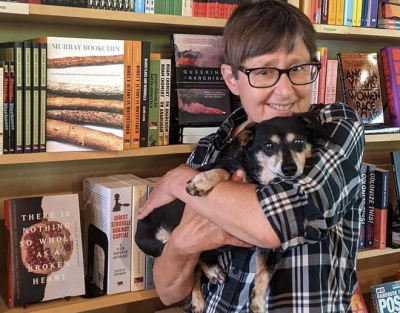By Sofia Tomasic, December 9, 2022
Cindy Milstein, a queer Jewish anarchist, activist, and writer, came to Oberlin last Friday to talk about their latest work, an anthology they edited titled There is Nothing So Whole as a Broken Heart: Mending the World as Jewish Anarchists.
This interview has been edited for length and clarity.
Could you give me an overview of how you define Jewish anarchism?
I’ll start with how I understand anarchism, which is a political philosophy of freedom that isn’t that old; maybe 150, 175 years old. It looks at how our forms of social relationships and social organization could revolve, or should revolve, around aspiring to be a social structure of free people in a free society of free beings, not just humans. Anarchism has a dual process or practice. It’s very much about questioning and dismantling all forms of hierarchy, domination, oppression, and subjugation — things like the state, colonialism, capitalism, fascism, et cetera. In its place, and at the same time, anarchism tries to envision and experiment with how we structure our daily lives as much as possible around egalitarian, do-it-ourselves forms of self-organization: self-determination, community self-defense, self-governance. Anarchists fill that out with a whole constellation of ethics, like solidarity, collective care, and mutual aid.
We’re now in the Hebrew year 5783, and Judaism spans the whole world and all races, genders, and cultures. It’s a religion, but it’s a lot more. It’s a philosophy, an ethic, a way of being, a culture, and it’s kind of a way of thinking, too. At the core of Jewishness and Judaism is this foundation of continually questioning and interpreting and communally coming at ways of living. So, putting those together, I understand the core of Jewishness and Judaism as being ultimately a story of liberation and how we continually strive for that in the here and now, wherever we end up. I understand Judaism as a sacred duty, which goes along with anarchism.
For most of that history — and I understand myself as a diasporic Jew — we’ve existed outside of empires or states or nations. We’ve almost never been part of those bodies, yet we’ve continually created these really powerful communities. So to me, Judaism and Jewishness is this incredible experiment and beautiful lived practice of having community and solidarity and life without states. Anarchism by itself is a political philosophy in practice — it’s not enough in itself, it isn’t the whole of life. It’s a politics, in a sense. So, anarchism beautifully says we should always bring the whole of who we are to anarchism, which is how Judaism fits in with it.


